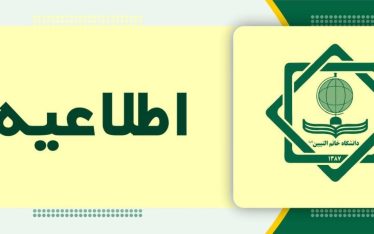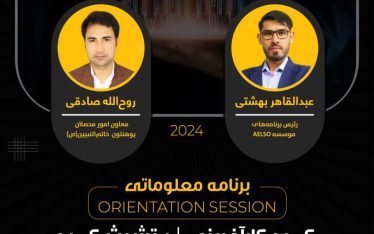A familiarization program about the legislative and legal mechanisms of the Ministry of Justice was held for the students of Khatam al-Nabieen University of the Faculty of Jurisprudence and Law in cooperation with the Ministry of Justice of the Islamic Republic of Afghanistan. The aim of this program, which was held on Tuesday, November 24th, 2020, was to get the law students acquainted with the legislative and legal process of the ministry. This program was organized by the Faculty of Jurisprudence and Law in cooperation with the Ministry of Justice in the Academician Hall of Grand Ayatollah Mohseni, Khatam Al-Nabieen University. The program was attended by the university chancellor, Dr. Mohammad Vahid Binesh, the board of leadership, number of other professors and students.
The program began with a recitation of a few verses from holy Quran and national anthem, and then Mohammad Aman Riyazat, spokesman for the Ministry of Justice, explained the ministry’s working mechanisms to the students.He said, the Ministry of Justice is engaged in drafting legislative documents, handling legal petitions, defending public and state assets in the courts, providing free legal aid, registering political parties, social institutions and real estate affairs, and handling renege applications. He said, “the Ministry of Justice also chair the High Commission for Combating Human Trafficking and Migrant Trafficking and overall the ministry of justice is responsible for coordinating and managing the fight against the mentioned phenomenon.He added, the ministry personnel are responsible to works in this fields in accordance with the law and regulations.”
The spokesman for the Ministry of Justice also explained the process of legal aid department, the appointment or recruitment of a lawyer for the poor defendants and raising public awareness about their rights and responsibilities, and said that although the facilities of the Ministry of Justice in this area are limited, efforts are being made to provide lawyers for underprivileged defendants as a guarantor of a fair trial throughout the country, as well as to update and streamline legal awareness methods. He called on participants to take part in legal awareness, which is everyone’s national responsibility.
Dr. Qasem Ali Sadaqat, a university professor, also spoke about the challenges in the law and the legislative process. He stressed the need to comply with Islamic rules, international standards and the constitution in the legislative process. He stressed the need to respect Islamic and human thought in legislation, and said that law makers must believe in these values. He said, the coherence and validity of laws and challenges in the legislative process also depend on this matters. Mr. Sadaqat also stressed the importance of simplifying terminology in law and also partnering in the drafting of laws and legislative documents before finalization with universities and professors, and said that such an approach would help harmonize laws.
The Ministry of Justice also planned to hold such programs in other educational and academic institutions to raise awareness about mechanisms of this ministry. The Ministry of Justice is also interested to receive opinions, suggestions and criticisms from the academic community to improve legal process and make the activities of the Ministry of Justice more effective. The Ministry of Justice is also committed to cooperate with the country’s educational institutions in related matters. At the end of the meeting, the meeting ended with questions and suggestions from law students and explanations of the responsibility of the Ministry of Justice.

